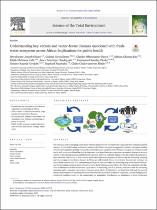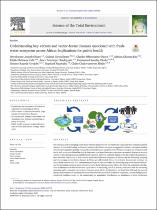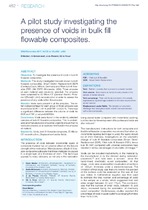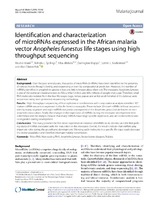Understanding key vectors and vector-borne diseases associated with freshwater ecosystem across Africa: Implications for public health
Abstract
The emerging and re-emerging vector-borne diseases transmitted by key freshwater organisms have remained a global concern. As one of the leading biodiversity hotspots, the African ecoregion is suggested to harbour the highest number of freshwater organisms globally. Among the commonly found organisms in the African ecoregion are mosquitoes and snails, with a majority of their life cycle in freshwater, and these freshwater organisms can transmit diseases or serve as carriers of devastating diseases of public health concerns. However, synthetic studies to link the evident abundant presence and wide distribution of these vectors across the freshwater ecosystems in Africa with the increasing emerging and re-emerging vector-borne diseases in Africa are still limited. Here, we reviewed documented evidence on vector-borne diseases and their transmission pathways in Africa to reduce the knowledge gap on the factors influencing the increasing emerging and re-emerging vector-borne diseases across Africa. We found the population distributions or abundance of these freshwater organisms to be increasing, which is directly associated with the increasing emerging and re-emerging vector-borne diseases across Africa. Furthermore, we found that although the current changing environmental conditions in Africa affect the habitats of these freshwater organisms, current changing environmental conditions may not be suppressing the population distributions or abundance of these freshwater organisms. Instead, we found that these freshwater organisms are extending their geographic ranges across Africa, which may have significant public health implications in Africa. Thus, our study demonstrates the need for future studies to integrate the environmental conditions of vectors' habitats to understand if these environmental conditions directly or indirectly influence the vectorial capacities and transmission abilities of vectors of diseases. We propose that such studies will be necessary to guide policymakers in making informed policies to help control vector-borne diseases.
Collections
Related items
Showing items related by title, author, creator and subject.
-
Understanding key vectors and vector-borne diseases associated with freshwater ecosystem across Africa: Implications for public health
Gbadegesin, Janet Temitope; Okoro, Onyekwere Joseph; Deme, Gideon Gywa; Okoye, Charles Obinwanne (Science of The Total Environment, 2023)The emerging and re-emerging vector-borne diseases transmitted by key freshwater organisms have remained a global concern. As one of the leading biodiversity hotspots, the African ecoregion is suggested to harbour the ... -
A pilot study investigating the presence of voids in bulk fill flowable composites
Mulder, Riaan; Mohamed, Nadia; du Plessis, A.; le Roux, S.G. (South African Dental Association, 2017)OBJECTIVE: To investigate the presence of voids in bulk fill flowable composites. METHODS: This study investigated two well-known bulk-fill flowable composites, Smart Dentin Replacement (SDR) (Dentsply/Caulk, Milford, ... -
Identification and characterization of microRNAs expressed in the African malaria vector Anopheles funestus life stages using high throughput sequencing
Allam, Mushal; Spillings, Belinda L.; Abdalla, Hiba; Mapiye, Darlington; Koekemoer, Lizette L.; Christoffels, Alan (BioMed Central, 2016)Background: Over the past several years, thousands of microRNAs (miRNAs) have been identified in the genomes of various insects through cloning and sequencing or even by computational prediction. However, the number of ...




